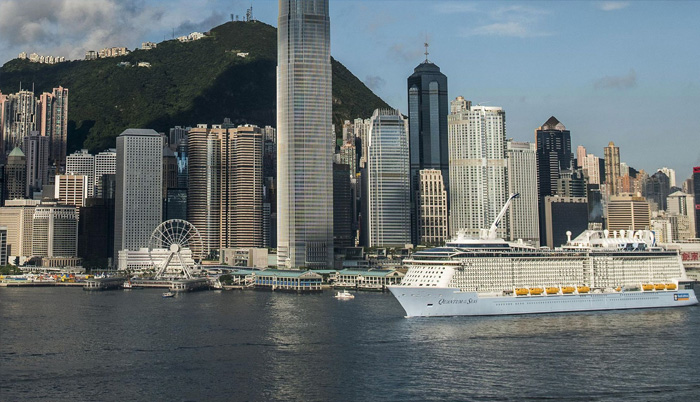![]() Home > World Business
Home > World Business
Investors Bet on Cruises, Corner Stores, Cosmetics in Aging Asia

Photographer: Xaume Olleros/Bloomberg
![]() April 7th, 2017 | 08:52 AM |
April 7th, 2017 | 08:52 AM | ![]() 1957 views
1957 views
CHINA
China may be at risk of getting old before it gets rich, but investors can still get rich from China getting old.
And it’s not all just about buying health-care stocks. Cruise operators, convenience stores and cosmetics makers are emerging as sectors that stand to benefit from the demographic consequences of the Communist leadership’s now-abandoned one-child policy.
China’s latest population plan estimates that about a quarter of the country’s population will be 60 years old or older by 2030. This is a new phenomenon for the country, said Tuan Huynh, Deutsche Bank Wealth Management’s Singapore-based Asia-Pacific chief investment officer. “With this kind of increase in age and age groups, there will be a change in patterns of spending.”
Cruises
Aside from investing in health-care, Deutsche is betting on cruise-operating companies to play the shift in spending and travel patterns it anticipates.
Traveling on a cruise ship might be “more comfortable” than air travel for older people, Huynh says
Huynh recommends investing in a basket of companies within the sector to avoid “single stock risk”
Asian cruise passengers have tripled to 2.1 million in 2015 from 2012 with a majority coming from China, according to the Cruise Lines International Associations, a trade group for the industry
Shenzhen-listed Chongqing New Century Cruise Co., which operates travel routes within China, has gained 46 percent this year compared to the S&P Citic Consumer Discretionary Index, which has risen 5.5% as of Wednesday’s close, Bloomberg data show
U.S.-listed cruise companies, Royal Caribbean Cruises Ltd., Norwegian Cruise Line Holdings Ltd. and Carnival Corp have also risen at least 10 percent this year
Convenience Stores
China joins Japan and South Korea in a broad pattern of aging across northeast Asia. BNP Paribas Investment Partners sees convenience stores in Japan and South Korea as ways to play the trend, said Arthur Kwong, its head of Asia Pacific equities.
“I don’t think the market is fully digesting the message about aging. The demand is so solid and while people know about the theme, not everyone knows which stocks to own,” Kwong said
Convenience stores in Japan and South Korea are increasingly targeting the elderly, and are “super convenient” for less-mobile customers preferring to travel shorter distances to get meals and daily necessities. “This is a good story about capturing the demographic change”
Listed companies in Japan and South Korea that derive at least 40 percent of their revenue from convenience stores include Seven & I Holdings Co., FamilyMart UNY Holdings Co., Lawson Inc. and BGF Retail Co.
Since 2010, Seven & I +102%, Family Mart +153%, Lawson +90%, BGF Retail +424%
Seven & I’s 7-Eleven stores in China have almost doubled to 2,182 locations in the 10 years leading up to 2015, according to its 2016 corporate outlook statement
The group had 187 stores in Beijing, 70 in Tianjin, and 60 in Chengdu, Sichuan Province, as of Dec. 31, 2015
China, Japan and Korea are similar in terms of their demographic aging, and demand for products and services from these consumer segments are the same, Kwong said
Cosmetics
Cosmetic companies benefit from a mix of aging across Asia and growing affluence in China, patterns that have seen an increase in discretionary spending on lifestyle and “well-being” related goods and services, said Christopher Wong, a Singapore-based fund manager at Aberdeen Asset Management Asia Ltd.
“All these cosmetic products are doing well in China and consumers are traveling outside of China to buy these products,” Wong said by phone
South Korea-listed biopharmaceutical company Medy-Tox Inc., which manufactures the type-A botulinum toxin chemical used in Botox injections is an “interesting one,” Wong said
Other cosmetics-related companies include: AmorePacific Corp., LG Household & Health Care Ltd., Korea Kolmar Co., Cosmax Inc., Hotel Shilla Co., Kose Corp., Pola Orbis Holdings Inc., Lion Corp., Unicharm Corp., Kao Corp., Fancl Corp., Shiseido Co.
Source:
courtesy of BLOOMBERG
by Livia Yap
If you have any stories or news that you would like to share with the global online community, please feel free to share it with us by contacting us directly at [email protected]